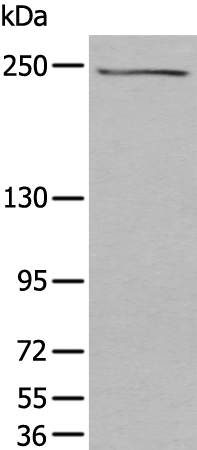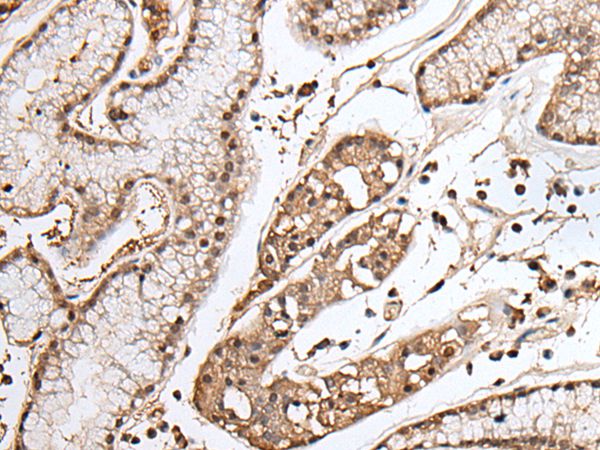

| WB | 咨询技术 | Human,Mouse,Rat |
| IF | 咨询技术 | Human,Mouse,Rat |
| IHC | 1/ 20-100 | Human,Mouse,Rat |
| ICC | 技术咨询 | Human,Mouse,Rat |
| FCM | 咨询技术 | Human,Mouse,Rat |
| Elisa | 咨询技术 | Human,Mouse,Rat |
| Aliases | OF; XDP; BA2R; CCG1; CCGS; DYT3; KAT4; P250; NSCL2; TAF2A; N-TAF1; TAFII250; DYT3/TAF1; TAFII-250; TAF(II)250 |
| Entrez GeneID | 6872; |
| WB Predicted band size | 213kDa |
| Host/Isotype | Rabbit IgG |
| Antibody Type | Primary antibody |
| Storage | Store at 4°C short term. Aliquot and store at -20°C long term. Avoid freeze/thaw cycles. |
| Species Reactivity | Human,Mouse |
| Immunogen | Synthetic peptide of human TAF1 |
| Formulation | Purified antibody in PBS with 0.05% sodium azide. |
+ +
以下是3篇关于TAF1抗体的文献概览,涵盖不同研究方向:
---
1. **文献名称**: *TAF1 variants and their overexpression in hepatocellular carcinoma*
**作者**: Suzuki, Y., et al.
**摘要**: 该研究利用TAF1抗体进行免疫组化分析,发现肝细胞癌(HCC)组织中TAF1蛋白显著过表达,并与患者预后不良相关。研究提示TAF1可能作为HCC的潜在生物标志物。
---
2. **文献名称**: *TAF1 mutations in X-linked dystonia-parkinsonism*
**作者**: O'Rawe, J.A., et al.
**摘要**: 通过TAF1抗体进行Western blot和免疫荧光实验,发现TAF1基因突变导致神经元中转录复合体功能异常,与X连锁肌张力障碍-帕金森综合征(XD综合征)的发病机制密切相关。
---
3. **文献名称**: *TAF1 regulates the transition from transcription initiation to elongation*
**作者**: Beckmann, H., et al.
**摘要**: 研究采用TAF1抗体进行染色质免疫沉淀(ChIP-seq),揭示TAF1在RNA聚合酶II从启动子区域向延伸阶段转换中的关键调控作用,为转录机制研究提供新视角。
---
这些文献分别从疾病标志物、神经遗传病机制和基础转录调控角度,展示了TAF1抗体的应用场景及研究价值。如需扩展至4篇,可补充TAF1在细胞周期中的功能研究(如与p53的相互作用)。
TAF1 (TATA-box binding protein-associated factor 1) is a critical subunit of the TFIID complex, a general transcription factor essential for RNA polymerase II-mediated gene transcription. As the largest component of TFIID, TAF1 plays a pivotal role in initiating transcription by recognizing core promoter elements, facilitating chromatin remodeling, and serving as a scaffold for assembling the pre-initiation complex. It contains multiple functional domains, including histone acetyltransferase (HAT) and kinase activities, which regulate promoter-specific histone modifications and transcription factor interactions. Dysregulation of TAF1 has been implicated in cancers, neurodevelopmental disorders, and viral pathogenesis, making it a subject of extensive research.
TAF1 antibodies are indispensable tools for studying its expression, localization, and molecular interactions. They are widely used in techniques like Western blotting, immunofluorescence, and chromatin immunoprecipitation (ChIP) to investigate TAF1’s role in transcriptional regulation and disease mechanisms. For example, studies employing TAF1 antibodies have revealed its overexpression in certain cancers, such as hepatocellular carcinoma, and its involvement in cell cycle control. Additionally, these antibodies aid in exploring TAF1’s interaction with viral proteins, shedding light on host-pathogen dynamics. Validated TAF1 antibodies are crucial for ensuring specificity, particularly given the protein’s structural complexity and homology with other TAF family members. Ongoing research continues to leverage these reagents to dissect TAF1’s multifaceted functions in health and disease.
×